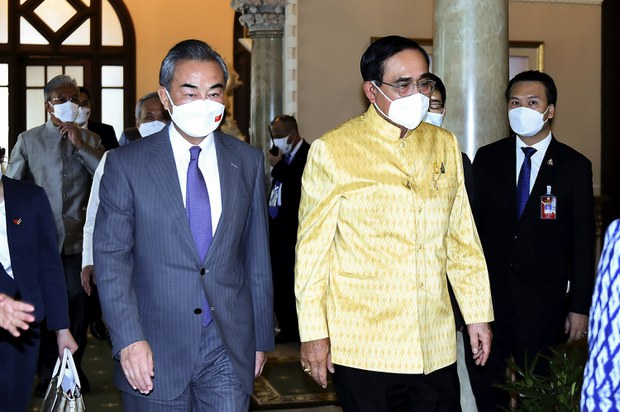Wang Yi Ready to push Chinese’s Global Development Initiative on Southeast Asian
BANGKOK, LELEMUKU.COM - Chinese Foreign Minister Wang Yi is on a nearly two-week tour of five Southeast Asian countries during which he will push Beijing’s new plan for worldwide development support with “Chinese wisdom” called the Global Development Initiative.
Wang arrived in the Philippines on Tuesday night after beginning his 12-day tour in Myanmar and Thailand. He’s also scheduled to visit Indonesia and Malaysia during his trip until July 14, according to the Chinese foreign ministry.
The tour is an attempt to show that Beijing is committed to its neighbors despite the ongoing conflict in Ukraine, analysts said. It comes on the heels of a summit in Germany where leaders of the Group of Seven countries committed to raising more than a half-trillion U.S. dollars to finance infrastructure in developing nations to counter China’s Belt and Road Initiative (BRI).
During his stop in Bangkok on Tuesday, Wang met with Prime Minister Prayuth Chan-o-cha and Thai Foreign Minister Don Pramudwinai and talked up Sino-Thai relations.
“[E]ven though the world’s situation is disturbed and changing all the time, the relationship between China and Thailand will be forever stable. Between us, there is only relationship and cooperation,” he said during a joint press conference with Don.
“We both agree on many issues. We agreed to jointly build joint societies for the future of Chinese and Thais, making it a guideline to future joint cooperation for both countries …. The objective of the joint societies is to stress that Chinese and Thai are no strangers but kin. The relationship is robust.”
Wang’s trip through Southeast Asia conveys a message that China will not ignore the region during the current volatile situation in the world, said Nur Rachmat Yuliantoro, a professor of international relations at Gadjah Mada University in Indonesia.
“China is a major actor in the dynamics of politics and security in Southeast Asia. China’s role and influence cannot be ignored,” Nur Rachmat told BenarNews.
China wants to reaffirm that it will remain a friendly country with shared interests in the region, he said.
While in Bangkok, Wang indulged in some durian diplomacy as well, as he stressed the relationship between China and Association of Southeast Asian Nations (ASEAN) member-states Laos and Thailand.
“I believe we three countries can produce pasteurized durian as a Thai agriculture product,” the top Chinese diplomat said, as he spoke about economic corridors linking China with Laos and Thailand.
“The goal is to drive for logistics, trade [and] investment in the three countries’ industries. We make this route for the true benefits of the people in the three countries,” Wang said.
Dulyapak Preecharush, an assistant professor of Southeast Asian Studies at Thammasat University in Bangkok, sees Wang Yi’s trip as “an underlining of China’s influence” in the Mekong region “which focuses on the Belt and Road Initiative (BRI) linking China-Thailand and Laos.”
The BRI is Beijing’s estimated $1 trillion-plus infrastructure program to build a network of railways, ports and bridges across 70 countries.
The trip also focusses on “forging ties with ASEAN member countries to deter the U.S.’s Indo-Pacific strategy which is creeping into South China Sea and offering more assistance to Taiwan,” he told BenarNews.
Wang’s visits to the Southeast Asian nations follows G7 summit last week, where leaders announced that their governments together would raise $600 billion funds over five years to finance infrastructure in developing nations to counter the Belt and Road Initiative.
‘GDI is still vague’
In the mix, now, is Chinese President Xi Jinping’s Global Development Initiative, or GDI, which, according to one observer, Beijing will tout more than BRI in the months to come.
“GDI is becoming what BRI was, and the foreign minister has to sell that idea … this trip is a push for GDI,” said Gyude Moore, a former Liberian minister who is currently a senior fellow at the Center for Global Development, a think-tank in Washington.
“GDI is China’s theory of global public good, of how international development ought to be.”
Moore said the GDI was still a vague concept and currently “an easy sell so many countries can join” without really knowing what it is, and that will enable Beijing to show the numbers that support the concept.
Another analyst, Sarah Cliffe, of the Center on International Cooperation at New York University, said China had stepped into the space that the West vacated when it failed to deliver financing to poorer nations during the height of the COVID-19 pandemic.
“GDI is still vague … but they will frequently refer to sustainable development,” Cliffe told BenarNews.
“But GDI is broader in concept than BRI.”
What Cliffe is certain about, though, is that the G7 summit and Wang’s Southeast Asia trip “are in relationship with each other.”
Wang arrived in Manila late Tuesday, becoming the first foreign envoy to visit to the longtime U.S. defense ally in Southeast Asia after the Philippines’ new leader, Ferdinand Marcos Jr., took office last week.
In a Facebook post, Chinese envoy to Manila Huang Xilian said the visit would fully reflect “how China attaches importance to our countries’ bilateral relations.”
Marcos Jr. said Tuesday that his new administration would boost ties with Beijing, including through military exchanges, amid ongoing South China Sea tensions over Chinese ships in Philippine-claimed waters. Wang is set to meet with Enrique Manalo, the newly appointed Filipino foreign secretary, on Wednesday.
Wang will attend the G20 foreign ministers’ meeting in Bali on Friday, where he is also expected to meet with Indonesian officials.(Shailaja Neelakanan/ Wilawan Watcharasakwet/ Nontarat Phaicharoen/ Camille Elemia /Alvin Prasetyo | BenarNews)
